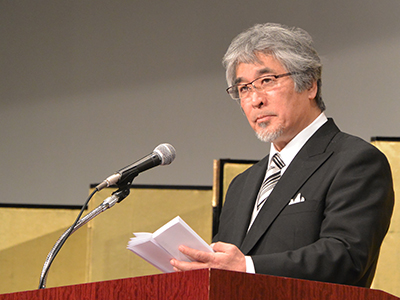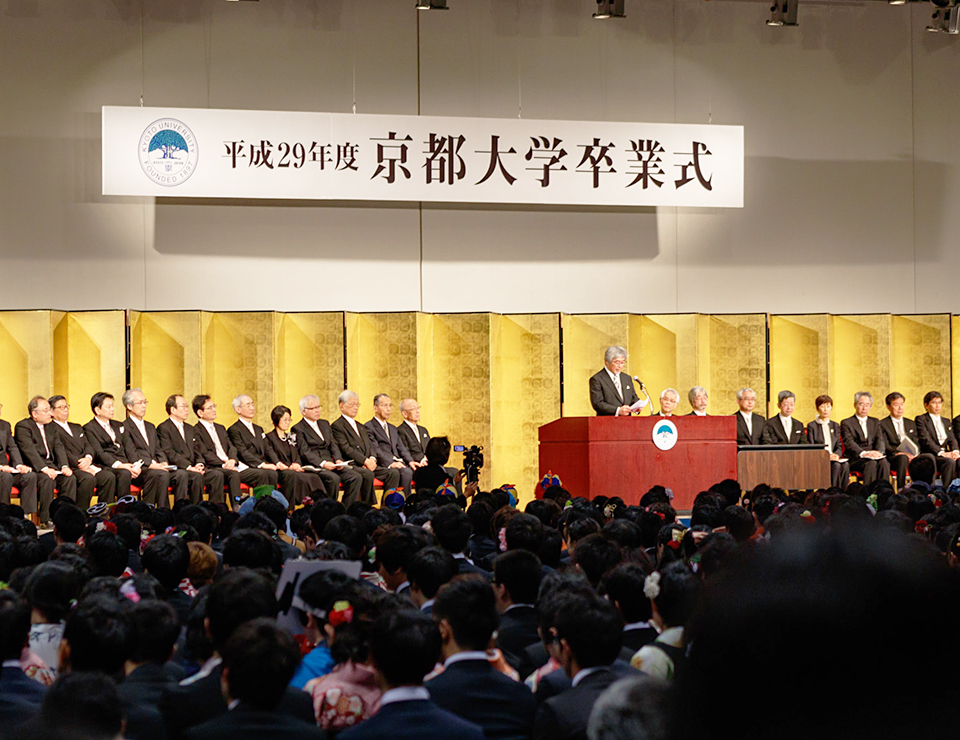Juichi Yamagiwa, 26th President

Let me begin by congratulating the 2,871 students who are graduating from Kyoto University today. On behalf of our guests of honor, former Presidents Hiroo Imura, Makoto Nagao, and Hiroshi Matsumoto, as well as the Executive Vice-Presidents, Vice-Presidents, Deans, and Directors here today, and all other faculty and staff, I want to extend our heartfelt congratulations to each of you. I would also like to express our deepest gratitude to the family members and others around you who have provided you with so much generous support in working toward this, your graduation day. From the first graduation ceremony in 1900, three years after the University's founding in 1897, to the end of today's ceremony, Kyoto University will have awarded bachelor's degrees to a total 208,614 students over its 120-year history.
What kinds of lives have you all led since you first entered our institution? Today, I'd like you to look back on the years you have spent at Kyoto University. As new students, having succeeded in passing the fiercely competitive entrance examinations, what hopes and dreams did you have for your time here? Were you able to attain those goals during the last few years, leading up to today's ceremony? Or, did your dreams undergo significant transformation during your time here? And, how are the new paths on which you are about to embark connected to your original aspirations?
Last year, a book entitled Sapiens: A Brief History of Humankind , written by Hebrew University of Jerusalem historian Yuval Noah Harari received Japan's Business Book Award. I read this book as soon as it was released. It was very interesting, and I wrote a review on it, but had no idea that it would be so well received by businesspeople. The book traces prehistoric human evolution with the aim of grasping the essence of human existence and exploring the nature of civilization up to the present day. The pioneering work on this theme was surely Jared Diamond's Guns, Germs, and Steel . Diamond focused on regional differences in how civilizations developed, attributing them to differences in the makeup and ecological conditions of each continent. A number of volumes have been published recently that similarly explore human history on a grand chronological scale: these include Daniel Lieberman's The Story of the Human Body: Evolution, Health, and Disease , Gregory Clark's A Farewell to Alms: A Brief Economic History of the World , and Matt Ridley's The Rational Optimist: How Prosperity Evolves . The popularity of these volumes in Japan is undoubtedly linked to a desire among businesspeople and the general public not only to know more about familiar social trends and world affairs but also to go back in time to ascertain the true nature of human existence. I think it is safe to say that the flipside of this phenomenon is an uncertainty over how best to define and put one's trust in humanity.
The first question posed by Yuval Noah Harari in Sapiens is that of why humans made the shift from the carefree, naturalistic hunter-gatherer lifestyle to agriculture, which was grueling and often detrimental to health. He suggests that the shift was not achieved instantaneously through technological innovation, but rather driven by a notion that hard work can lead to a better life, even under adverse conditions. Tracing the origins of this notion to the cognitive revolution that took place some 70,000 years ago, Harari declares that the advent of human language gave birth to new thought patterns and methods of communication, propelling homo sapiens out to all corners of the world and driving other human species and animals to extinction.
Insights from my own field of primatology suggest that the human brain, like those of other primates, is a social brain: it grew larger in line with the size of the groups in which humans lived. The present-day human brain is suited to life in groups of around 150 people, so it may not yet have adapted to the rapid growth in population that has taken place since humans started to farm the land and keep livestock. Instead, humans created myths and came to sustain life in large groups through an order of the imagination. Harari explains, for example, that money is not a physical reality but a system of mutual trust, one that brought different cultures, languages, and religions together and led to globalization.
The problem today is surely that the basic capitalist principle that underpins the human aspiration for a future that is superior to the present — in other words, the notion that economic growth is the ultimate good — is beginning to disintegrate. In the days when I was a student at Kyoto University, Japan was still in a high economic growth phase, and it seemed that a brighter future was just around the corner. The World Expo was held in Osaka, and there was a real sense that science and technology was opening up a whole series of new possibilities. Eventually, however, concerns were raised over the deterioration of the global environment, and it became clear that the growing impact of human activity was causing the rapid onset of environmental pollution, global warming, and other forms of degradation. "Sustainable development" became the new catchphrase, and a number of international conventions were established in the hope of preventing further damage to the planet. A consensus developed that earth's resources are finite, and there is a limit to how far human development can go.
The world has undergone immense changes in the few years you have spent at Kyoto University. Even as Japan struggled to recover from the Great East Japan Earthquake, the Great Kumamoto Earthquake struck and affected many people. Intensifying ethnic and religious conflicts have resulted in large numbers of refugees and distorted well-established cooperative frameworks and partnerships among nations. In the face of rapid developments in social and world affairs, such as the United Kingdom's departure from the EU, the shift to unilateralism in the United States, and China's One Belt One Road initiative, how did you respond and what kinds of resolutions did you make afresh?
Ideas about life itself have also changed considerably. Spectacular progress has been made in iPS cell research led by Professor Shinya Yamanaka. This research is imbued with Professor Yamanaka's fervent desire not only to pursue the truth but also to help those afflicted by intractable illnesses. However, the rapid advancements in medical technologies using iPS cells, as well as gene editing technologies, have given rise to a wide range of ethical questions surrounding the bio-environment and outlooks on humanity. This is because broad possibilities have opened up not simply for curing illness, but also for intervening in the beginnings of human life and the genetic scenarios of humans. These factors govern the age profile of society and the life plans of individuals to a considerable extent, impacting social stability and dynamics. Moreover, the linkage of medicine and business in bio-ventures is beginning to generate prodigious wealth and emerging as a force in the global economy.
Medical technologies and drug discovery are not the only areas of progress today. Rapid advancements are also being made in information and communication technologies, and in the globalized world we are starting to let our own thinking be led by technology. Advancements in information devices have enabled us to access existing knowledge with ease, whenever and wherever we choose. Huge volumes of video material are streamed free of charge through our devices, and books are no longer an indispensable means of acquiring knowledge. Nonetheless, for innovations to be made in science and technology it is crucial to have a solid outlook on the human condition as well as knowledge of the humanities and social sciences. In this era, knowledge and outlooks must be reassessed by drawing on a stock of integrated scholarly insights. You will all play a part in what is being called "Society 5.0", the ultra-smart society. In this society, advanced communication devices wield the power to connect humans and things, robots and artificial intelligence dominate in many fields of work, and opportunities for face-to-face interaction may be lost. I believe, however, that in such a society it will be more important than ever for humans to relate to one another and to manifest their capacity to live as they engage with the world.
I am sure that all of you graduating today have experienced free and open-minded discussions of the same type as pursued by the generations of KyotoU graduates who came before you. These experiences, together with your fellow alumni, are sure to prove extremely valuable to your lives from here on. At Kyoto University we uphold a tradition of respect for creativity. We are proud of our enthusiasm for new challenges; blazing trails into uncharted and previously untraversed territory. I am certain that many of you have acquired diverse and exceptional abilities, and are already applying them in various spheres of activity. There are sure to be many opportunities from now on for you to demonstrate the abilities you have cultivated at Kyoto University and put them to the test. What you must never forget, however, is to listen carefully to the opinions of those with different views from yours. It is crucial to take into account multiple points of view before you pass final judgment on and tackle the problems confronting you. At such times, our traditions of "academic freedom based on the ability to engage in dialogue" are sure to be of assistance.
"Peaceful coexistence across the global community" is a major theme that Kyoto University has pursued since its founding. In our present era, this harmony is disintegrating, and coexistence among people with diverse views is in jeopardy. You are sure to face situations all over the world that run counter to this ideal of peaceful coexistence. When you do, I hope that you will invoke Kyoto University's spirit of open debate and boldly tackle the challenges you face. The attitudes and behaviors that you display from now on as KyotoU alumni are sure to attract public attention and be a guide for the students that follow in your footsteps.
A great variety of paths lie ahead of you. However, those paths are sure to intersect again in the future. It is my sincere hope that when that happens, you will feel proud of being part of the KyotoU community.
Once again, let me offer my sincere congratulations to each and every one of you graduating today.


